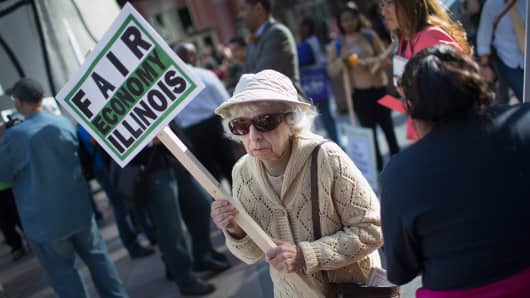OK, Illinois, it's your turn.
Following this week's $30 billion budget deal in Pennsylvania, Illinois became the last state without a tax and spending plan for the fiscal year that began last July.
While most states are busy planning next year's budget, Illinois now holds the dubious record for the longest budgetary foot-dragging in recent memory, according the National Conference of State Legislatures. (Until this week, Pennsylvania had tied with Kentucky, which didn't get around to approving its fiscal 2003 budget until late March of that year, according to the organization.)
Despite their spectacular fiscal fail, lawmakers in the Land of Lincoln are showing little sign of progress in breaking the deadlock, now dragging on nine months past the deadline. Since then, Republican Gov. Bruce Rauner has been holding out for a package of business incentives and changes in collective bargaining laws that a Democratic-controlled legislature wants no part of.
The impasse has already forced cuts in education and social services and produced a steadily rising stack of nearly $6.5 billion in unpaid bills. The state's controller, Leslie Munger, has estimated the backlog could top $10 billion by the time the current fiscal year ends in July. That money that will have to be made up in next year's budget, which is technically due July 1.
Read MoreIllinois budget fix: Just don't pay the bills
"The bottom line is the state cannot go bankrupt and we cannot print money," Munger told reporters last month. "Taxpayers are going to have to pay this bill."



